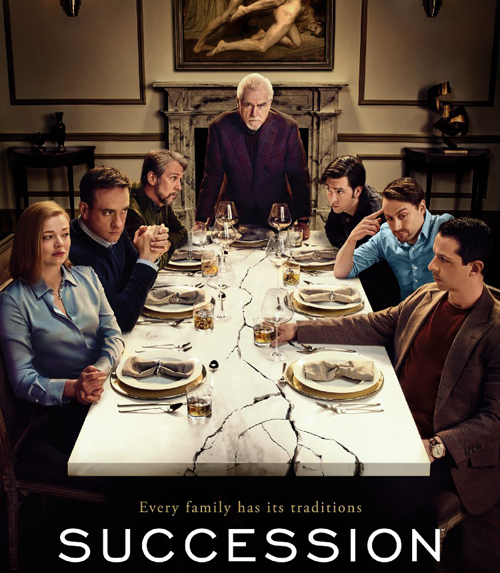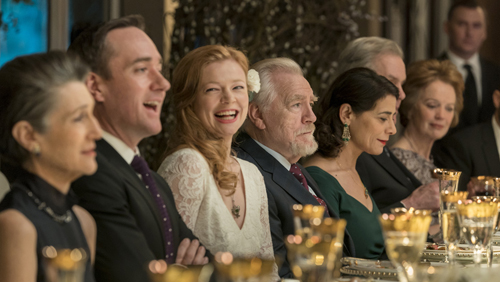
Your complimentary articles
You’ve read one of your four complimentary articles for this month.
You can read four articles free per month. To have complete access to the thousands of philosophy articles on this site, please
Television
Succession
Jack Murphy sees society’s morals faltering in a family feud.
Succession is a darkly comic TV show about dying media mogul Logan Roy and his family as they progress towards the end of his time as CEO of the conglomerate Waystar-Royco. As the name suggests, the show follows the drama of Logan choosing his successor. We see the terms of engagement, the personalities involved, and the endless power plays. We also see the inner workings of a media company as it weathers scandals, makes deals with competitors, and endlessly restructures. Other than the patriarch, other Roys include: Connor, the eldest son; Kendall, with a history of substance abuse; Roman (played by Macaulay Culkin’s brother Kieran), with lightning fast wit and an aversion to serious commitment; and finally, the only daughter, Siobhan or ‘Shiv’, who demonstrates the least heart and who attempts to forge her own career as a political consultant.
The children have their own plotlines: Kendall’s is about deciding whether to overthrow his Dad from inside or outside the company; Roman actually testing his grit through working in Waystar-Royco; and Shiv considering a path which puts her in political opposition to her father’s work. Of the other plotlines, the naturalisation of outsiders Greg (the cousin) and Tom (Shiv’s fiancé) is particularly thrilling, as both progress in their own moral degradation yet remain miles away from true inclusion in the family.

Succession images © HBO
Morality vs Ethics
To consider the moral issues presented by Succession, I think the best entry point is Immanuel Kant’s idea of people as ‘ends in themselves’. To treat people as ends in themselves is to treat them not merely as means to your own ends; or in Kant’s own terms, the good moral agent does not use others “merely as a means for the discretionary use for this or that will” (Groundwork of the Metaphysics of Morals, 1785). Primarily, this means to respect people’s capacity to choose, including taking account of their preferences.
Succession is a study of bad moral agents – those who use others merely as means to their ends. We see this play out everywhere in the main characters’ behaviours. The only person treated as an ‘end in himself’ is Logan Roy. We are constantly reminded of both the value and the authority of Roy as the head of his company, the head of his family, and as exerting an unclear but significant influence on the White House. However, the show is not about Logan, it’s about the perverse effect he has on everyone around him. It’s a philosophical investigation of power, especially of power dynamics in the home and in the workplace, and the difference between them.
There is a sense of ‘good and bad’ in Succession; but what’s good is defined as what benefits you, and what’s bad is what impedes you. Each character understands that everyone must do what they can to get ahead. There is a mutual understanding between them that everyone is out for themselves, and that anything done for one’s own sake is fair game. In this, Succession demonstrates the difference between an ethic and a morality. The show definitely has an ethic or ethos, in terms of a principle of behavior – and the principle is, pursue your own interest. Morality is irrelevant to the show’s characters. The ideal for them is pure egoism. Those proclaiming something to be morally wrong are told to ‘grow up’. In this the Roys are disciples of Thrasymachus in Plato’s Republic, who argues that “the just is always a loser in comparison with the unjust.” Perhaps the writer Jesse Armstrong is suggesting that moral sense cannot be only partly abandoned. Rather, a perverted nature runs deep, and the Roy children received their moral education in a ruthlessly Darwinian household. Once it’s off balance, they cannot realign their moral compass. (Well, the picture is a little more subtle, as will become clear when I discuss the role of family.)
The results of this study in selfishness are sometimes jarring and at other times shocking. The viewer is shocked by extreme acts, always taking place outside of the boardroom. We see the Roys humiliate non-family members, and hear that they humiliated each other as a rite-of-passage. And this deplorable activity is not confined to business contexts. It’s not just a successful business strategy. These individuals bring power-play to work, and then back home again.

The maleficent seven
Language Use & Abuse
The relationship that egoists like these have to language is another striking feature of the show.
We use language in large part to share facts; and through conversation we scrutinise, test, and work out the implications of facts. The use of language is remarkably loose in Succession because here the purpose of communication is not the sharing and interpretation of knowledge. Instead, language becomes an instrument for getting what one wants. This has a particularly amusing effect on the pleasantries at the beginning of sentences. Wanting to get to the meat of the conversation, and acutely aware of what they want out of their interlocutor, the characters speed through ‘hellos’ and ‘how are yous’. Indeed, Roman will say anything else. Logan Roy, at the head of this family of egoists, speaks solely in commands – except in the rare case that he needs something from someone. Brian Cox won a Golden Globe Award for his portrayal of the patriarch; but one of his finest acting qualities is shared by the whole family – an apathetic attitude to conversation which nonetheless clutches the attention of the viewer.
I’ve also found my own relationship with language altered whilst watching Succession. I started to ignore large swathes of the dialogue, because it’s not important – all that matters is who’s been promoted, fired, hired: who’s in the good books, and who’s in the dog house.
Ambiguity & Corruption
I have hesitated to offer a full moral condemnation of the Roys. One of the strengths of this show is its characters’ depths. You feel like people of this sort could, and likely do, exist. They are not simply villains who embody particular vices.
What then do the Roys care about? Do they care about their family as a means to personal power? Or do they show loyalty to their family through their pursuit of power? Do they have any values aside from gaining power?
The show is ambiguous on this front. This ambiguity is illustrated beautifully in the second season, when the company faces trouble. The Roy children exclaim that they must preserve the company; but it’s no longer clear whether they want to preserve it for the sake of their family or for personal gain. If the Roys are preserving the company because it's the family business, then they do have a value beyond sheer self-interest – family. This value is also displayed in the Roys’ responses to the fraught mental health of one particular Roy child. The siblings do overstep him in order to get ahead; but only after first checking on him, and trying to resuscitate his Machiavellian spirit.
The question of family values in Succession brings us back to the star around which everything revolves: Logan Roy. The children are all tasked with vying for his spot, to succeed him. But they lose their ruthlessness where Logan is concerned. Roman, Kendall, and Shiv are all capable of taking him down, but they all hesitate.
Here too there is ambiguity. Perhaps the children are just convinced of the omnipotence of their father, who has dominated their family, jobs, and country. However, there are too many empathetic moments, too much erring away from betrayal at the last minute, for us to ignore the possibility that the Roys truly love their father and could not betray him.
The Romantic philosopher Jean-Jacques Rousseau (1712-1778) helps illuminate this strange dynamic between an uncaring persona and an underlying empathy. The central thesis in his Second Discourse on the Origin and Basis of Inequality Among Men (1755), is that humans are naturally good but corrupted by society. For Rousseau we have a natural instinct, pitié, which compels us to alleviate the suffering of others. It is only within a stratified society that we begin to feel competition with and loathing for other human beings. In these circumstances, our sense of pitié is skewed by self-interest, and other people become the recipients of our contempt rather than our compassion. We can clearly see an illustration of Rousseau’s thinking in the world of Succession, where everyone is treated as either a threat or an irrelevant, and human compassion is suppressed. And so the greatest question for Rousseau is also the most contentious within Succession: does modern society corrupt individuals to the core? How much humanity is left in the acutely competitive humans of modern society?
In Succession we can see the treatment of others as mere means; we can question the value of justice; and most of all, we can wonder about the effect that our society and its values has on our moral character.
© Jack Murphy 2020
Jack Murphy is a philosophy postgraduate and essayist.









